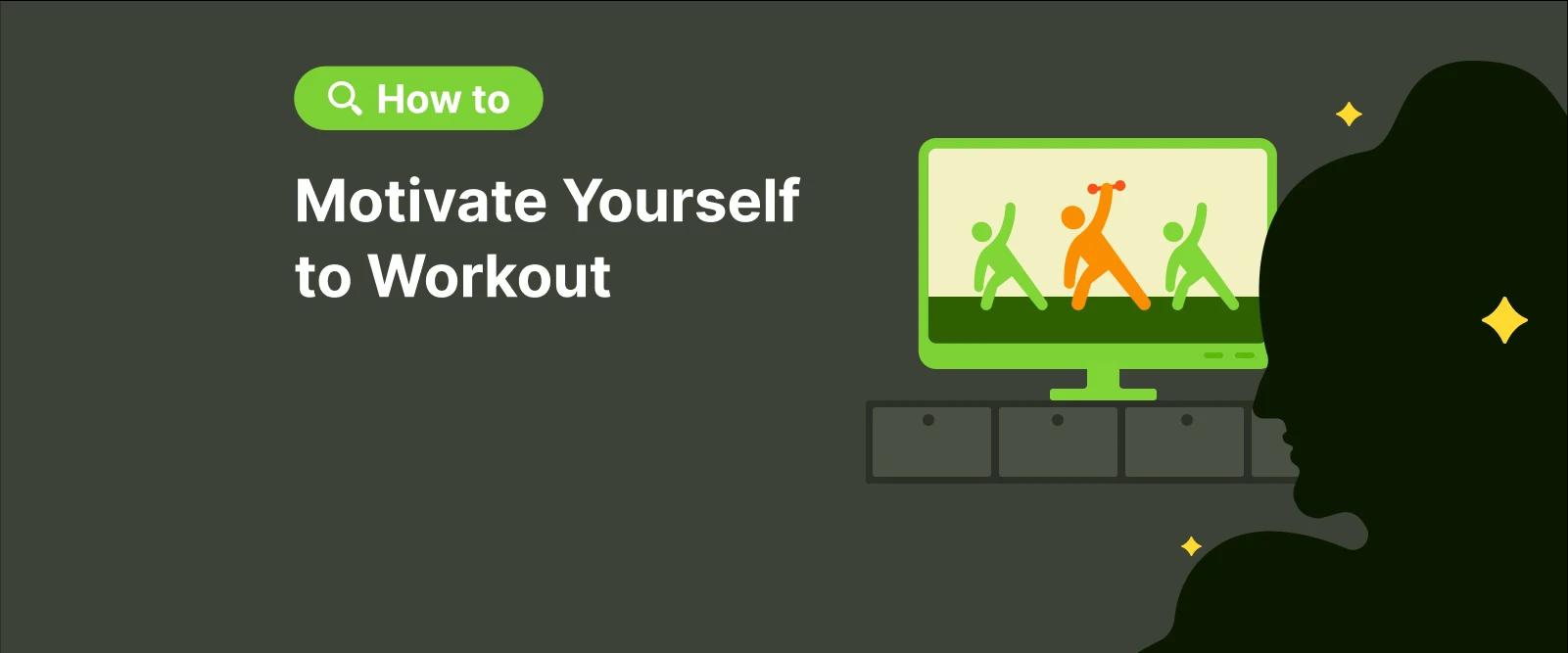The World Health Organization (WHO) reports that people who are not active enough have a 20–30% increased risk of death compared to people who stay active. Regular exercise can do more than you think. Physical activity can enhance physical function and mental health, thereby lowering your risk of chronic illnesses, such as heart disease.
Additionally, strength training increases testosterone levels, which can positively impact motivation. Cardio stimulates blood circulation, and oxygen reaches your brain faster, making thinking clearer. Pretty amazing, right?
Headway offers fitness and motivation books in 15-minute summaries that explain what motivates people to move and actually enjoy it. Learn from experts who studied exercise psychology for years. Our app sends daily reminders about what you've learned, so the information stays in your head when you're tempted to skip.
📘 Download Headway and stop bailing on workouts today!
Quick answer: Ten effective ways to motivate yourself to work out
Set clear goals
5-minute rule to get started
Establish a morning fitness routine
Find a workout buddy
Create a motivational playlist
Follow fitness influencers for inspiration
Focus on regular workouts
Visualize the future body you want
Read motivational biographies
Try the Headway app to listen to book summaries on motivation and making healthy habits
Now, let's look into them in more detail.
Why do we struggle with the motivation to work out?
Often, it's these factors that become obstacles to regular physical activity:
Little free time, too many things to do, other priorities
Physical issues, including poor health and injuries
Lack of energy for it, constant fatigue
Lack of discipline, willpower, and organization
Strength training and gym sessions can have both positive and adverse effects on motivation. On one hand, seeing progress, improving physical fitness, and feeling strong can increase motivation. On the other hand, boring routines, lack of progress, or inconvenience of the gym can kill motivation.
Ten actionable tips to motivate yourself to work out

1. Set clear, achievable goals
The most challenging aspect of starting a workout is maintaining motivation over the long term. Most people tend to set too high goals and strain to achieve them as quickly as possible, leading to frustration with the "slow" path and a loss of motivation.
There's no point trying to run a marathon after two weeks of training. The main thing is to make gradual progress. So, to stay motivated, start by defining a program for each workout that matches your current fitness level.
In 'The First 20 Hours', Josh Kaufman recommends setting specific goals instead of vague desires for "body wellness." Set a weight loss goal, such as "lose 1–2 pounds per week," or fitness goals, like "Exercise 3–4 times per week for at least 30 minutes," or "Do 10 full push-ups or 1-minute plank without rest."
If you enjoy running, try improving your personal best time for a distance or breaking your previous record. The closer you get to your goal, the more enjoyable the process will be and the more motivated you'll become.
2. Stack your habits
In 'No Excuses,' Brian Tracy states that regular practice and repetition help turn practical actions into habits. So why not make your little workouts a part of your daily routine?
Record even the smallest results. Take pictures of yourself, track even minor changes in weight and measurements, and note any other noticeable changes. Regular exercise affects our physical fitness, health, and psychological well-being.
So pay attention to all the changes that occur in you. Has it become easier to concentrate? Has your stress level decreased? Have negative thoughts disappeared? Great!
Make a workout schedule that fits into your daily routine. For example, write tasks on a calendar, not just a list (2:00–2:30 pm — fitness, jogging, gym). Consistency is crucial for forming new habits and maintaining motivation in the long run!
3. Use the 5-minute rule
Many people who can't get themselves to start doing something lack motivation or desire (mood). However, motivation often emerges once you start. The hardest part is getting started, so how do you do it? Try the 5-minute rule.
The 5-minute rule is a cognitive behavioral therapy technique used to combat procrastination. Using the 5-minute rule, you set a goal to do something you would otherwise avoid, but you only do it for five minutes. It can be a warmup; you'll often want to keep going after that
This technique also applies to full-body workouts. A half-hour of cardio or a heavy workout can seem daunting. But five minutes? That's doable and not too scary.
4. Build a morning ritual
A good morning exercise routine can help make your day more productive and enjoyable. Morning exercise, even simple ones like stretching or a basic workout, helps regulate your sleep-wake cycle, energize you, and improve your mood. So swinging your arms and legs, doing jumping jacks, and squatting in the morning is a great way to start the day. A reasonable amount can give you a surge of strength and endorphins.
5. Find an accountability partner
Exercising alone can sometimes feel dull. However, there are easy solutions: consider getting your friends or family to join you, hire a personal trainer, or take fitness classes with a group for added motivation.
Exercising with others will boost you and make it harder to cancel your workout if you've promised to meet up with a friend or colleague.
Promising your partner, friend, coworker, or even family member that this time you're going to exercise for the long haul can be like making a pledge, because it's a matter of conscience. Agree with someone that you'll send your results by a specific time. Promising creates external accountability, which can motivate you.
6. Create a motivational playlist
Get in the mood for a nice workout or run by choosing your favorite music or podcast and fabulous workout clothes.
Music can help people get into the rhythm and sports mood, allowing them to focus before a workout, game, or lift. Music can help block out distractions, improving concentration by associating certain songs with specific emotions.
It can also extend to playlists, as selecting specific songs in a particular order to evoke certain emotions and mental states can help reduce pre-game anxiety or pressure. Besides getting you in the zone, music can boost morale and confidence.
Some studies from the National Institute of Health have shown that breathing and heart rate can match the rhythm of music.
7. Follow fitness influencers
To stay inspired, follow fitness bloggers, read success stories, and watch motivational videos. Watching others overcome their fitness challenges can fuel your determination and motivate you to make lifestyle changes.
Fitness bloggers post helpful content about sports, healthy eating, and active lifestyles. They also host online workouts and weight loss marathons.
Thanks to social media, anyone can replicate a workout from a star trainer or train online alongside a professional athlete by watching their live broadcast.
8. Reward consistency over intensity
You should not perceive physical activity as a duty. Instead, it should be a pleasure that gradually becomes a necessity.
If one hour of exercise per day feels excessive initially, consider dividing your exercise routine into two 30-minute sessions. After all, it is better to do short workouts regularly than one large exercise session lasting an hour.
Recognize and celebrate your achievements, no matter how small they may seem. Every milestone forward, even a small one, is a testament to your dedication and hard work.

If you're more comfortable with home workouts instead of a gym with lots of people or gentle pilates instead of strength exercises, choose what makes you happy! Pleasure is the motivation and desire to engage in this activity consistently.
9. Visualize post-workout success
Picture yourself achieving your fitness goals. Envisioning a healthier, stronger, and fitter version of yourself can be a powerful motivational tool. Visualize how achieving these goals will positively impact your life.
Write down the health benefits, add some pleasant self-care procedures to improve your body condition, and boost energy. It will give you confidence! The future result will give you the energy to plan time for self-improvement in your calendar.
10. Read motivational stories
Motivation is key to thriving both physically and mentally! It all starts with a bright, uplifting thought that inspires you to take action and embrace life fully.
Motivational stories may not be related to sports, but they can help you get through a difficult period when you need support or motivation. Consider the complex yet victorious stories of others.
For example,
The story of a girl from Pakistan, Malala Yousafzai, who survived a terrorist attack and later became a world-famous speaker and fighter for education. Listen to the 'I am Malala' summary in the Headway app.
In 1942, the Austrian psychologist Viktor Frankl was imprisoned in the Theresienstadt concentration camp. How did he manage not only to survive in such inhuman conditions but also to maintain his sanity, dignity, and sense of meaning in life? Find out more in the 'Man's Search for Meaning' summary, available in the Headway app library.
In 'Mud, Sweat, and Tears', Bear Grylls teaches how to survive in different wild conditions. His extreme adventures worldwide can motivate you to get off the couch and not be afraid to be active. Your body can do more than you think.
Book-based workout motivation
Find more motivation for physical activity in this selection of books:

1. 'The Body' by Bill Bryson
Bryson notes that regular physical activity:
Lowers the risk of heart attacks by 31%
Improves mood, memory, and fertility
Strengthens the immune system and bones
Reduces the likelihood of developing diabetes, depression, and dementia
Has a positive effect on every organ in the body
"In 2011, an interesting milestone in human history was passed. For the first time, more people globally died from non-communicable diseases like heart failure, stroke, and diabetes than from all infectious diseases combined. We live in an age in which we are killed, more often than not, by lifestyle." ― Bill Bryson, 'The Body'
2. 'The First 20 Hours' by Josh Kaufman
Kaufman recommends choosing skills that genuinely interest you. This approach naturally increases motivation and encourages regular practice.
He emphasizes the importance of creating conditions that support regular practice, such as minimizing distractions and having easy access to the necessary materials and tools. Kaufman recommends spending at least 20 hours practicing a new skill before attempting it.
"If you rely on finding time to do something, it will never be done. If you want to find time, you must make time." ― Josh Kaufman, 'The First 20 Hours'
3. 'No Excuses' by Brian Tracy
Brian Tracy sees motivation as the result of personal responsibility and self-discipline. He argues that success in any area of life is not an accident, but the result of purposeful action.
"Every act of persistence strengthens every other act of persistence. When you discipline yourself to persist, over and over, you like and respect yourself more and more. You become stronger and more confident. Eventually, you become unstoppable." ― Brian Tracy, 'No Excuses!'
4. 'Mindset' by Carol S. Dweck
Carol Dweck talks about fixed mindsets and growth mindsets. People with a fixed mindset tend to avoid challenges because they fear making mistakes, perceive criticism as a personal attack, and often give up when things get tough.
A growth mindset encourages growth through effort, learning, and practice, and loves challenges. Mistakes are viewed as an integral part of the learning process.
"No matter what your ability is, effort is what ignites that ability and turns it into accomplishment." ― Carol S. Dweck, 'Mindset'
Four common mistakes to avoid in a workout
Distractions can mislead and pull you away from a consistent, harmonious exercise routine. You can look at someone online and compare yourself, putting in more effort than necessary, and easily burn yourself out, which reduces your motivation to exercise. Some more traps:
Expecting excellent results in a week is a common mistake. Many people expect dramatic results after a few visits to the gym. While this idea is tempting, it's not realistic.
Repeating the same exercise program is a surefire way to get stuck in a rut. It is essential to try something new occasionally.
Pushing yourself too hard can risk injury. Warming up reduces the risk of injury and allows you to get the most out of your workout.
Skipping rest is another mistake. Rest is part of training; after training, your body must repair tissue and improve bone health.
Boost your workout motivation with Headway to achieve lasting success!
Figure out how to motivate yourself to work out by understanding the benefits of exercise, finding your actual reason for starting, building a workout routine you can maintain, and creating habits that work without constant willpower. Set goals you can finish this week, not vague someday plans.
Headway is here to help: we offer fitness and motivation books in 15-minute summaries showing what keeps people exercising when they'd rather quit. Learn from experts who spent years studying exercise psychology. Good luck with your workouts!
📘 Download Headway and quit bailing on exercise.
FAQs about how to motivate yourself to workout
How can I make working out more enjoyable?
To make working out enjoyable, turn on your favorite music, exercise outdoors, invite like-minded people to join, set a specific goal, and achieve it!
What are some quick workouts for busy schedules?
Add exercise to your work calendar as an event. Twenty minutes is better than nothing. Combine exercise with other things, such as waiting for something or cooking dinner. Walk more while doing your things, exercise at home, and don't waste time at the gym.
Can tracking progress help with motivation?
Measuring your improvement is one of the best ways to stay motivated to exercise. Keep a small journal to remain fully motivated and get the most out of your physical activity. You can use it to write down everything you did after each workout.
Are there mental techniques to boost workout motivation?
Yes, there are mental techniques for motivation. For example, visualizing the result, breaking the goal into smaller actions, defining the goal and why you're doing it, keeping a progress tracker, and practicing mindfulness to understand yourself and your body's needs.
What role does diet play in staying motivated to exercise?
Yes, diet plays a crucial role in workout motivation. You won't have the energy to work out effectively without enough protein, carbohydrates, and fats. A balanced diet has a positive effect on your well-being and mood.
















